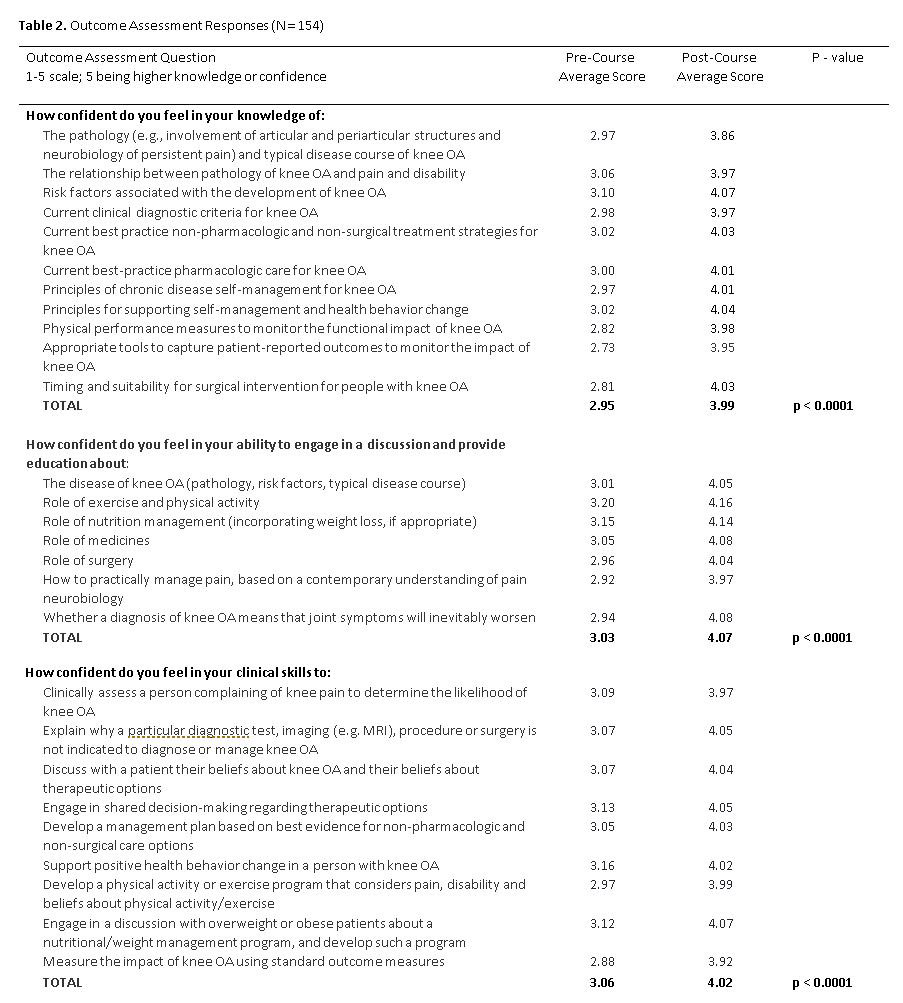Session Information
Session Type: Abstract Session
Session Time: 10:30AM-11:30AM
Background/Purpose: Primary care practitioners (PCPs) care for the majority of patients with knee osteoarthritis (KOA). However, lack of training and access to resources makes it challenging for PCPs to possess the confidence and competence to effectively manage these patients. To address these barriers, we designed and implemented a free internet-based program to enhance PCPs’ confidence in their ability to care for patients with or at risk of painful KOA.
Methods: We applied Caffarella’s Integrative Planning Model to design a program which incorporates opportunities for both asynchronous interactive learning with spaced retrieval, and synchronous sessions for collaborative learning in Communities of Practice.
The first component of the curriculum is comprised of online modules with evidence-based content aligned with the ACR 2019 Guideline for the Management of Osteoarthritis of the Knee. To stimulate engagement, self-assessment, and learning, case-based questions focused on recognizing patients at high risk for KOA, distinguishing KOA from other causes of knee pain, and individualizing patient management, are embedded throughout the modules. After responding, participants receive immediate feedback. The modules also provide information on how to access curated resources to support patients’ self-management.
After completion of the online modules, participants receive 1 isomorphic case-based question weekly for 18 weeks to reinforce learning. In addition, participants who complete the modules are invited to attend Virtual Discussion Groups. These synchronous remote sessions are led by content experts on topics such as physical therapy, nutrition/weight loss, acupuncture, cognitive behavioral therapy, and the role of surgery. These Virtual Discussion Groups provide participants with opportunities to raise questions and work through real-world challenges in the management of patients with KOA.
Confidence regarding knowledge and skills relevant to the evaluation and management of patients with KOA is measured before and after module completion using a standardized instrument. The program went live on 4/5/2022. Initial outcomes were analyzed with paired t-tests.
Results: Of the first 327 enrollees, 62% identified as female, almost half focused on primary care, and there was a wide range of years in clinical practice (Table 1). Of the first 154 to complete the modules, there were statistically significant improvements in confidence in knowledge, clinical skills, and ability to engage in a discussion and provide education about KOA (Table 2).
Feedback on the modules was positive: 98.1% agreed/strongly agreed with the statement: “I would recommend this program to others” and 95.5% agreed/strongly agreed that “Overall, the content covered in this activity to date has been useful and relevant to my scope of practice.”
Conclusion: This online program to support PCPs’ evidence-based care for patients with KOA is feasible, perceived as relevant, and recommended by participants. Interim data show a statistically significant improvement in participants’ confidence in their ability to provide effective KOA care. Future plans to evaluate the second and third components of the curriculum are ongoing.
To cite this abstract in AMA style:
Mandl L, Lin M, Wall N, Mich-Gennari E, Klapak E, Nathif A, O'Brasky-Crawley M, Aizer J. An Online Program for Primary Care Practitioners Enhances Confidence in the Ability to Care for Patients with or at Risk of Painful Knee Osteoarthritis [abstract]. Arthritis Rheumatol. 2022; 74 (suppl 9). https://acrabstracts.org/abstract/an-online-program-for-primary-care-practitioners-enhances-confidence-in-the-ability-to-care-for-patients-with-or-at-risk-of-painful-knee-osteoarthritis/. Accessed .« Back to ACR Convergence 2022
ACR Meeting Abstracts - https://acrabstracts.org/abstract/an-online-program-for-primary-care-practitioners-enhances-confidence-in-the-ability-to-care-for-patients-with-or-at-risk-of-painful-knee-osteoarthritis/


